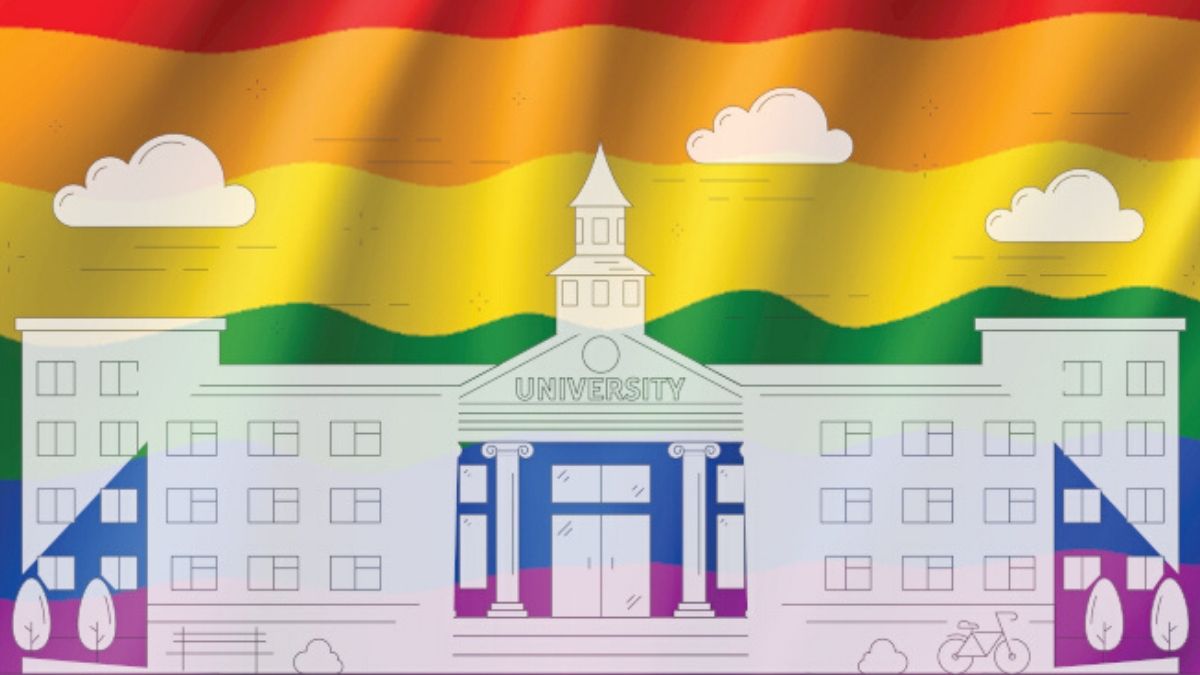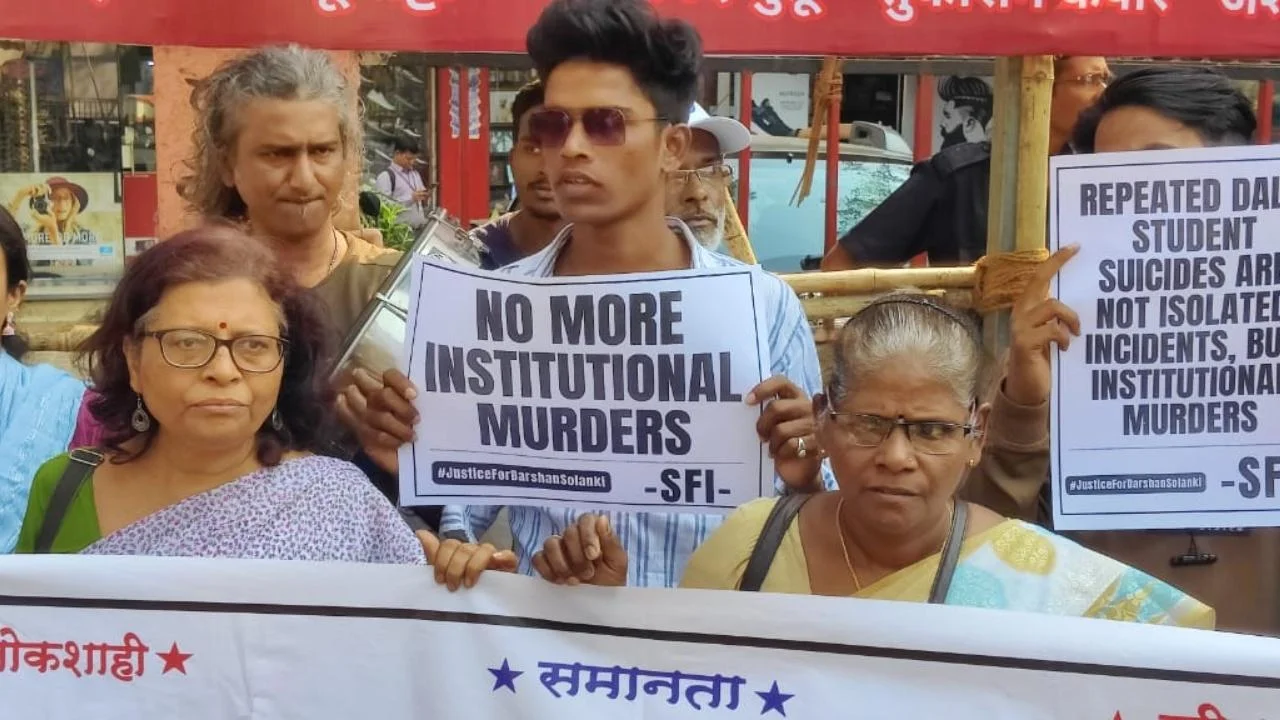Editor’s Note: FII’s #MoodOfTheMonth for September 2022 is Gender and Campus. We invite submissions on the many layers of this theme throughout the month. If you’d like to contribute, kindly refer to our submission guidelines and email your articles to sukanya@feminisminindia.com
In a park on campus, I sit with my friend on a bench that nicely fits us both. It is during the busy afternoon hours when most of the students have beelined to the canteens to suit their hunger pangs. We do this quite often and therefore, what I am going to narrate is not an isolated occurrence.
As we take breathing pauses between our engrossing conversations, we stand quite amused by the gazes that are directed at us. Suddenly, it seems that there is a flurry of activity around our bench. The security guards come to check in quite frequently, disguised as a random stroll. A flock of students point their gaze at me and whisper to themselves, a faculty puts their spectacles down to check if their eyes saw it right. My friend tells me that this hustle and bustle is missing when he is with his cisgender peers. Nobody bats an eyelid.
Initially, I dismissed this as his hypervigilance and did not take it to heart. But by now, it has happened so many times that I have started seeing a pattern to it. Perhaps, sighting a visibly trans person on campus does shake the dust for many.

With my final year examinations knocking at the door, I went to the campus office to complete admit card formalities. My heart was pounding in distress because my present photograph and self-presentation do not in any way match the dead-pan cis-appearing picture on my documents.
Just when I thought that the office person would let it pass without any hullabaloo, he kept comparing my photographs. First, it was a weird chuckle on his end, which was followed by him scanning me from head to toe.
I have slowly grown to recognise that this invisibility is a manufactured one, upheld by dominant social forces. Therefore, to make oneself visible is to also be at loggerheads with these forces. This can be a really uphill, lonely, and tumultuous journey that many queer/trans folks may be unwilling to take for themselves
I felt numb and strangely invaded while a queue of students piled up behind me. As he held out both photographs in his hand, my ‘truth’ was out, or so it seemed. Curious peeps at the back had already come forth to check out what was going on.
A few of them were by my side now as I stood there perspiring and thinking to myself when this would get over. I am sure the freakshow was quite a scandal for them as they kept eyeing me, their eyes gleaming with a sadistic pleasure of ‘discovery’. They started discussing it amongst themselves and I could hear the whispers.
I cleared the air saying that I have conveyed this to relevant authorities in my department and they are aware. It only made sense because I am doing my MPhil which is a very intra-departmental affair. He told me that I could have used my older photograph, that this picture would make the officers confused.
He was also discontent with the fact that I have not changed my documents although I explained that it would have only made matters more complicated since I was registered in this course based on my birth-assigned-sex.
Also read: Trans Voices In Campuses: The Need For Safe Spaces Beyond Electoral Lip Service

The conversation ended after two more rounds of scanning and a hefty sigh on behalf of the official. I too heaved a sigh of relief, but my relief was short-lived as inquisitive gazes kept tracking me till I walked out of the door.
At this point, it does not strike me anymore that I do not see any other visibly trans person on campus. I can feel the alienation in my bones and at times, I sincerely wish I melted in the shadows. This sadly coincides with haunting headlines such as the taking down of Transgender-Inclusive School Education document by the National Council of Educational Research and Training (NCERT), India after widespread community opposition.
I look forward to a time when campuses would be trans-ready and trans-equipped, but that still seems to be a shot in the dark in our country. Meanwhile, teaching and non-teaching staff, and gender-privileged students can practice good allyship and take up some of the responsibilities for advocacy. It is an active culture of support and affirmation that can go a long way in preventing the campus from becoming a killjoy for its trans students
I have slowly grown to recognise that this invisibility is a manufactured one, upheld by dominant social forces. Therefore, to make oneself visible is to also be at loggerheads with these forces. This can be a really uphill, lonely and tumultuous journey that many queer/trans folks may be unwilling to take for themselves.
For instance, in a seminar hall full of colleagues and faculties, a professor casually misgenders me and does not even offer an apology. This has happened even after I have informed all the faculties about my gender identity and transition journey. However, to bring this to light might also have the cons of me being labelled as touchy, or too sensitive, or taking ‘trivial‘ matters to heart.

A group of western researchers found that facing environmental barriers on campus can have detrimental effects on academic outcomes of transgender students. Often, campuses in the West have grievance cells and policy statements specific to transgender and gender-non-conforming students.
That is an unimaginable reality for the average Indian transgender student on campus, which then translates into them having to be their own advocate in a system that refuses to acknowledge their existence.
This may consume so much of time, energy, and resources that the person often fails to participate in the regular joys of campus life while constantly having to watch their back. There are a few progressive campuses that house queer collectives and try to shape the discourse around queer/trans rights and liberties; that is the exception rather than the rule.
I look forward to a time when campuses would be trans-ready and trans-equipped, but that still seems to be a shot in the dark in our country. Meanwhile, teaching and non-teaching staff, and gender-privileged students can practice good allyship and take up some of the responsibilities for advocacy.
It is an active culture of support and affirmation that can go a long way in preventing the campus from becoming a killjoy for its trans students.
Also read: Mainstream Feminist Spaces And Their Exclusion Of The Trans Community
Aritra Chatterjee (she/they) is an MPhil Trainee in Clinical Psychology at University of Calcutta, Kolkata, India. She is an ardent advocate for affirmative mental healthcare for gender and sex minorities with an intersectional focus. She has a vision of queering mental healthcare systems and unsettling complicit stakeholders. Aritra is on Facebook
About the author(s)
Aritra Chatterjee (she/her) is a clinical psychologist who actively advocates against discrimination against the LGBTQIA+ community while being a member of the community herself.





